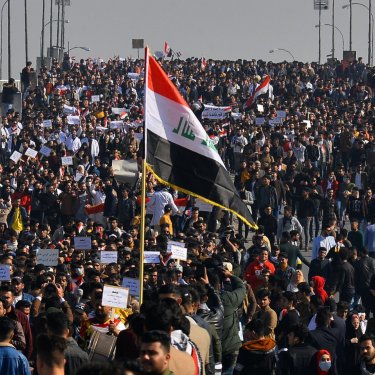Draconian bills resubmitted to Iraqi parliament

Reporters Without Borders (RSF) is alarmed about two old bills, one on cybercrime and the other on freedom of the expression and the right to protest peacefully, that have been resubmitted to the Iraqi parliament. Ambiguities in these bills legitimise curbs on press freedom and are liable to further encroach on the work of journalists in Iraq, RSF says.
“These two bills are a Trojan horse that will result in a crackdown on press freedom in Iraq,” said Jonathan Dagher, the head of RSF’s Middle East desk. “We call on parliament to take account of the requests for amendments made by Iraqi civil society organisations with the aim of ensuring that these bills serve their true purpose rather than becoming tools for silencing journalists.”
First submitted to the Iraqi parliament in 2011, these two bills have been resubmitted in their original form each time there is a new parliament, setting the clock back to zero and ignoring all the progress during previous parliamentary debates by means of amendments that bring them more into line with international standards.
The bill that is supposed to combat cybercrime and regulate the Iraqi cyberspace was resubmitted to parliament on 21 November and has been discussed since then. It alarms Iraqi journalists and media freedom NGOs because it contains threats – some vague, some very explicit – for journalists and freedom of the press. Article 8, for example, provides for penalties ranging from seven to ten years in prison and fines of at least 10 million Iraqi dinars (more than 6,500 euros) for anyone using cyberspace “with the intention to undermine religious, family or social values and principles.” This imprecise terminology would give many political and religious actors a free hand to muzzle the expression of a wide range of positions. Many of the bill’s prison sentences and fines are disproportionate, with around ten crimes punishable by life imprisonment.
The bill that is supposed to reinforce free speech and the right to protest peacefully was resubmitted to parliament on 3 December. Freedom of opinion and expression are guaranteed by article 38 of Iraq’s constitution but, again because of vague and ambiguous language that is open to interpretation and therefore to manipulation by the authorities, this bill reformulates and contradicts the constitutional safeguards rather than extending their applicability.
The 11-year-old cyber-crime bill was described by RSF as “a real threat to freedom to report the news online” in April 2012, shortly after it was first submitted. Each time these bills are submitted, civil society organisations propose amendments to remove ambiguities and eliminate excessively punitive aspects. But after each parliamentary election, the progress made under the previous parliament is forgotten, and the new parliament starts the debate again from scratch.
“The purpose of these bills is to keep us busy combating them,” the head of the Iraqi Press Freedom Advocacy Association, Mustafa Nasser, told RSF. “The authorities know that they are losing their legitimacy, so they attack the freedom of the press.”
The resubmission of these old bills come at the end of a year that has seen a big increase in violations of journalists’ right to cover events. One of the latest violations was a decree issued by the director-general of education in the southeastern governorate of Maysan on 28 November banning reporters from entering school buildings. Just two days before that, Iraq Fox cameraman Ali Kazem Al-Karimawi was clubbed by riot police while covering a protest in the Baghdad district of Kadhimiya.
